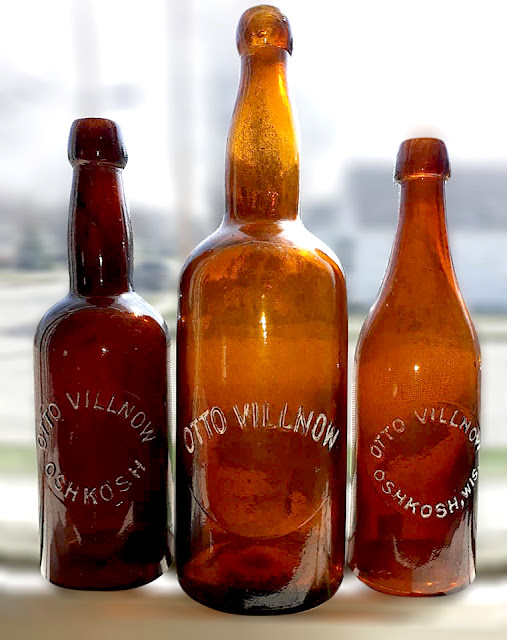 |
| Otto Villnow, Oshkosh beer bottler, and his wife Caroline, circa 1888. |
Otto Villnow was born in 1849 in the north of Germany. He was 17 when the 1866 cholera pandemic visited his homeland. Villnow fell victim to the dread illness and, shortly after, was pronounced dead. They packed him into a coffin and placed him in a vault.
A day and a half later, an attendant discovered that young Villnow was not altogether deceased. He was taken from his crypt and eventually made a full recovery. A year later, Villnow got the hell out of Germany.
He reached Oshkosh by 1873 and took a job at a sawmill. Later, after he had gotten married, Villnow ran a shoe store from the home he and his wife Caroline purchased at what is now 1417 Oregon Street. But in the early 1880s, Villnow took an interest in beer. In particular, the bottling of beer. He converted his property on Oregon Street into a beer bottling plant.
 |
| The site of Villnow's bottling operation, formerly 212 Oregon Street. |
Independent beer bottling plants became increasingly common in Oshkosh in the 1880s. Government regulation and the troublesome work of getting beer into bottles encouraged brewers to job out their bottling work to others. In Oshkosh, there were more than 20 independent bottlers like Villnow packaging beer in glass.
When I first wrote about Villnow here, I mentioned that he appeared not to have been affiliated with any particular brewery. But about a month ago, while doing research on an unrelated matter, I found that Villnow had worked at various times with two opposing Oshkosh breweries.
First, there was Lorenz Kuenzl's Gambrinus Brewery on Harney Avenue. Here’s an 1885 advertisement for the Gambrinus Brewery from the Wisconsin Telegraph, a German-language newspaper published in Oshkosh. The highlighted text translates into, "The bottles are filled by Otto Villnow."
 |
| Wisconsin Telegraph; August 28, 1885. |
The Kuenzl/Villnow alliance appears to have soured not long after that ad appeared. In December 1886 Kuenzl sued Villnow for monies owed to the tune of $269.79 (worth about $7,500 today). Kuenzl won the suit and Villnow was forced to pay up. Whether or not that immediately ended the partnership isn't known, but by the end of the decade, both men had moved on. Kuenzl partnered with his neighbor, Oshkosh bottler John Sitter. Villnow, meanwhile, hooked up with brewer August Horn.
 |
| August Horn. |
Unfortunately, that ledger lists no address where Villnow might have put Horn’s fixtures to work. City directories during this period also lack any mention of Villnow running a saloon. A possible explanation may be that Villnow was operating on behalf of a private club; he was affiliated with at least two of them in the early 1890s.
In any case, Villnow's ties to the Brooklyn Brewery disintegrated when the brewery merged with the Glatz and Kuenzl breweries in 1894 to form the Oshkosh Brewing Company. After that, Villnow was done with beer. He worked as a laborer and janitor in the years that followed until his retirement in 1910.
Otto Villnow was 64 when he died in his sleep at his home on the morning of November 5, 1913. This time it was for keeps.
 |
| Villnow's Grave in Riverside Cemetery. |
But a funny thing happened on Villnow's way to obscurity. The bottles he used in the late 1800s became highly sought after collector's items. Only a few of them have survived. His name is embossed on the faces of those bottles. The legacy of Otto Villnow lives on, captured in glass.
Thanks to Alan Lareau and Bob Bergman for help with German words and old, beer bottles...







No comments:
Post a Comment